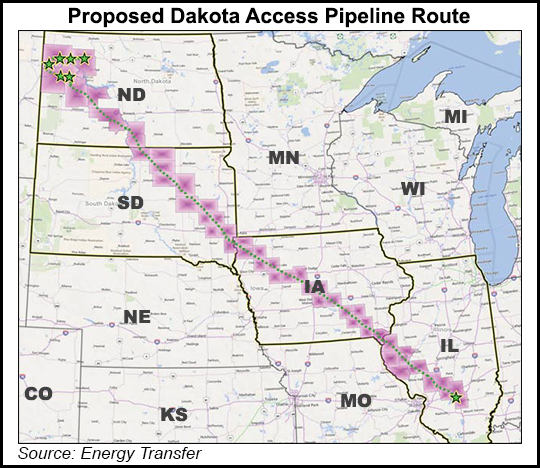Bakken Shale | E&P | NGI All News Access
Iowa Regulators Award Dakota Access Oil Pipeline Final Permit
As a follow-up to its initial approval in early March, the Iowa Utilities Board (IUB) on Friday issued the backers of the Dakota Access Pipeline a final permit to build the proposed four-state, 1,154-mile pipeline to ship Bakken crude to markets along the East, West and Gulf coasts.

In following conditions the IUB outlined for approval on March 10 (see Shale Daily, March 11), the board said Dakota Access has “substantially complied” with the requirements of the board’s original order, and so the IUB has issued a hazardous liquid pipeline permit to Dakota Access, LLC. The board also issued an order accepting Energy Transfer Partners’ (ETP) compliance filings required for the pipeline permit.
The IUB acknowledged that Dakota Access still must file various documents before starting construction on a simultaneous basis in all four states (North and South Dakota, Iowa and Illinois).
Earlier, Dakota Access committed to the IUB that it would file permits and approval documents from the U.S. Army Corps of Engineers and the Iowa Department of Natural Resources prior to commencing construction. The company has also committed to file final versions of mandated plans covering stormwater pollution prevention and unanticipated discoveries prior to commencing construction.
ETP’s Dakota Access Pipeline has said it will begin construction simultaneously in all of the states once the project satisfies the final conditions from the IUB (see Shale Daily, April 1).
On March 18, Iowa regulators denied the pipeline backers’ request to expedite the process and start construction immediately of the $3.8 billion crude oil project (see Shale Daily, March 28). Dakota Access Pipeline filed a subsequent “motion for clarification” and to set a permitting schedule that was also denied March 24.
A revised filing was subsequently submitted dealing with parcel-specific changes that the regulators made as part of their conditioned approval of the pipeline project and the condemnation request of Dakota Access on some parcels where easements could not be worked out with landowners.
© 2024 Natural Gas Intelligence. All rights reserved.
ISSN © 2577-9877 | ISSN © 2158-8023 |
